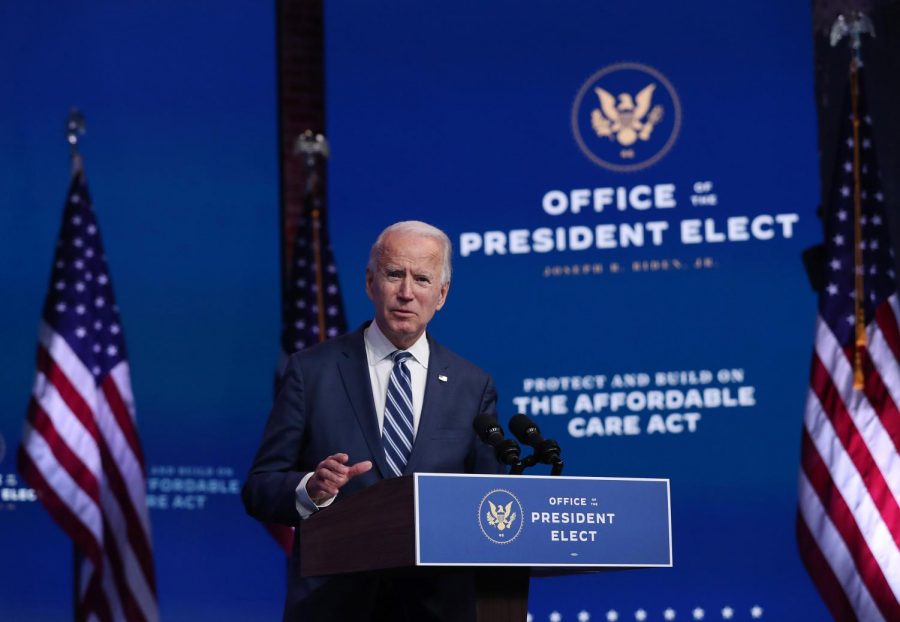Trump administration has corroded public trust
Biden administration cannot waste opportunity to be transparent with Americans
February 14, 2021
If there is anything that we can garner from the recent presidential election, it is the necessity of having an ethical and candid distribution of mainstream media. Social media platforms and mainstream media outlets are breeding grounds for the spread of misinformation, slanderous discussions and unethical practices.
The polarization of this election was catalyzed by former President Donald Trump, whose campaign practices involved spreading fraudulent news and sparking an insurrection through volatile Twitter posts and outright lies, especially regarding his denial of the election results. Though the decisions of most social media platforms to suspend the former President’s accounts were met with a collective sigh of relief, the task of preventing “fake news” is far from over. In fact, it is vital to our democracy that we push for more thorough practices of fact-checking to stint the dissemination of false information.
Trust in the public has been corroded through continual malpractice and manipulation, which has, in turn, spawned controversy, rabbit-hole conspiracy theories and social groups that have taken it upon themselves to act on these proposed falsehoods. Groundless organizations like QAnon have formed as a result of this indulgence of falsehoods; they can only be considered misguided robinhoods acting in the pursuit of personal gains, while furthering their bigot-filled, antisemitic and purely ridiculous agenda (the story of QAnon is another tangent I will not go into today). These organizations have grown to fruition due to the explosive accelerant that is former President Trump.
Beyond a failed, racist presidency, Donald Trump has forever changed the way we consume and trust the media. But, what more can we expect from a near fascist president that has force-fed propaganda to his citizens?
As president, he deflected every shrivel of fact or evidence that painted him in a bad light or shed truth on the many lies that he and his team purported, as if a bottle of water could extinguish a forest fire. The best example to illustrate this is the response from President Trump’s team following the insurrection. To preface; before the insurrection, the former president’s rhetoric at events and rallies bubbled to push his mindless followers to commit the final act of the circus production that was the Trump presidency: a reckless and pell-mell attack on our democracy. Despite being the benefactor of the chaos, then-President Trump expresses no culpable sentiments regarding his actions and accusations as being the initiator of the violence. This is ironic in consideration of his ‘Save America’ rally, where he urged his followers to “fight like hell” and implored them to voice their concerns right down at Pennsylvania Avenue.
A post-Trump society is one of dishonesty and shameless lying that affects more than just media consumption. The path to rebuilding public trust starts with the Biden administration and a necessity for transparency. After four years of lies and corruption, the American people need a president that can look beyond the dollar sign and reach the people. It is our responsibility to hold President Joe Biden accountable for his promises. Yet this notion of accountability is not limited to the President, it extends to every politician.
President Biden stated during his inauguration speech on Jan. 20 the requirement that we “must reject the culture in which facts themselves are manipulated, and even manufactured.” It is a relieving change to see that the President acknowledges the dangers of misinformation and poor political tactics, but as conscious consumers of social media and citizens, we need to take every word with a grain of salt. The insurrection, again, is a prime example of the minacious nature of “fake news,” and although it should not have taken an act of domestic terrorism to wake America up, it was a necessary call to action.
Both social media platforms and bodies of government hold a responsibility to reflect upon and re-evaluate their policies regarding the distribution of media. In this regard, there is a heated conversation revolving around the idea of “freedom of speech” and the corporations in America that regulate the people’s speech. However, it is not only a necessity, but a responsibility for these companies to moderate the type of content that is distributed to the masses. While regurgitating false information to support your ideals may seem like a harmless declaration of “opinion,” it can easily be entrapped in the snowball effect and create baleful consequences that infringe on the safety and wellbeing of our society as a whole. The creation of recuperative policies and actions — and hopefully, one day, preemptive ones — will pave the way to slowly rebuilding public trust.















